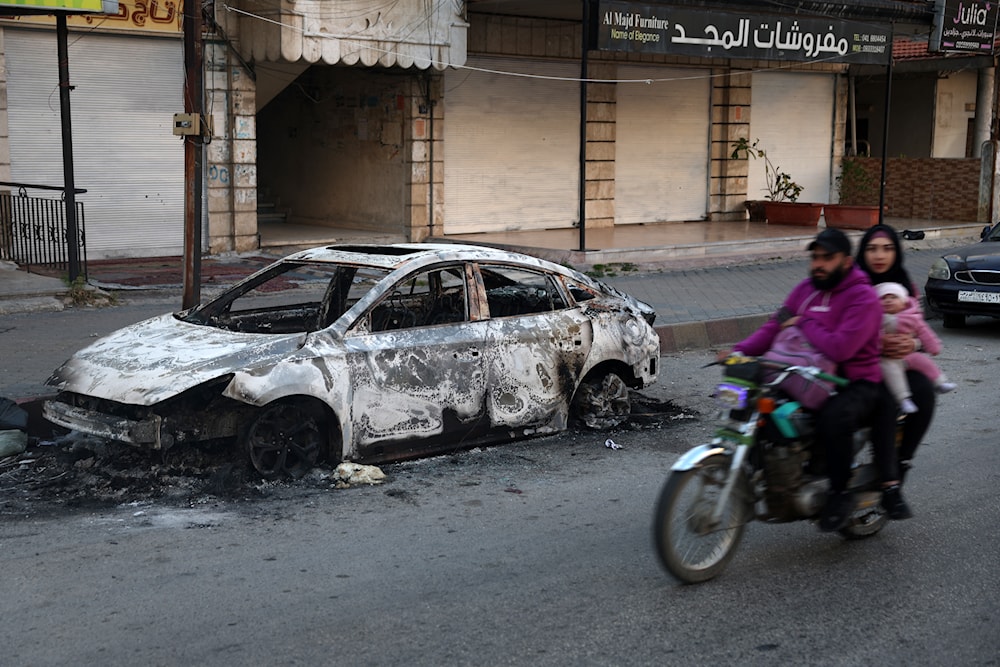Syria on path to fragmentation, al-Sharaa has limited time to act: FT
In an opinion piece, the former head of the UK’s foreign intelligence service says the interim president does not have much time to prove his ability to build the inclusive Syria he has promised.
-
 Members of a family riding a motorcycle drive past a charred car in the town of Jableh in Syria's coastal province of Latakia on March 12, 2025 (AFP)
Members of a family riding a motorcycle drive past a charred car in the town of Jableh in Syria's coastal province of Latakia on March 12, 2025 (AFP)
The violence that erupted in Syria’s coastal cities is a troubling indication of the country’s potential fragmentation along sectarian lines, suggested John Sawers, the former head of the UK’s foreign intelligence service (MI6), in an opinion piece published in the Financial Times.
Sawers stressed that sectarian violence serves as a "wake-up call" for Syria’s interim president, Ahmad al-Sharaa, adding that his promise to form an inclusive government "has so far proved largely empty."
He further asserted that al-Sharaa had self-appointed himself to power, noting that he focused on consolidating authority for himself and the narrow bloc he led during last month’s National Dialogue conference in Damascus, which was attended by "other opposition groups."
The report reminded that Hay'at Tahrir al-Sham (HTS), led by al-Sharaa, emerged from al-Qaeda’s Syrian branch, highlighting that the interim president and his armed followers "are still rooted in a brand of Salafist Islamism that is unpopular even within the majority Sunni community."
Sawers pointed out that al-Sharaa appointed his HTS aides to senior positions in the new military after dissolving the former Syrian Aab Army and police force, arguing that he had repeated "the painful mistakes the Americans made in Iraq after the fall of Saddam Hussein’s regime."
The former MI6 chief emphasized the need for al-Sharaa to act swiftly to demonstrate his commitment to building an inclusive Syria, warning that "trying to re-establish autocratic power in such a diverse country is a recipe for violent resistance."
"There are too many armed militias, too much scope for meddling by outside powers, and also a determination among Syrians not to go back to rule by one community over all the others," he added.
The writer described an agreement signed between the Kurdish-led Syrian Democratic Forces and the new Syrian authorities as "a vital first step" but emphasized that "action with other minorities and regions must follow," as "militias will not accept disbandment unless they know their communities’ interests have legal and constitutional protection."
"Security is essential but that means bringing all the militias into a common approach, not forcibly disarming them," Sawers indicated, asserting that Alawites should be granted "a respectable place" in the new system.
In addition, the writer indicated that the Syrian constitutional declaration issued on Thursday contains some useful principles but emphasized that "the promised representative assembly will have to be genuinely open to debate and avoid rigid adoption of sharia law."
The report further argued that al-Sharaa must attract skilled Syrian expatriates with international expertise to lead a technocratic government, clarifying that such a government could facilitate the lifting of remaining Western sanctions and revitalize the economy—which necessitates power-sharing rather than its concentration in his hands.
At present, Sawers said, Syria "is on a path toward fragmentation," which would represent a missed opportunity and a gift to terrorist organizations such as ISIS and al-Qaeda.
He cautioned that al-Sharaa does not have much time to prove his ability to build the tolerant and inclusive Syria he has promised.
Read more: Kurdish-Led admin rejects al-Sharaa constitutional declaration

 4 Min Read
4 Min Read








